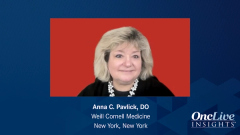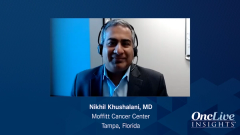
Unmet Needs and Prognosis for CSCC and Melanoma
Skin cancer experts discuss prognosis and unmet needs in the cutaneous squamous cell carcinoma and melanoma treatment spaces.
Episodes in this series

Transcript:
Sunandana Chandra, MD, MS: Dr Pavlick, given that you see these patients daily in your clinic, what are the biggest unmet needs in each of these histologies, both cutaneous squamous cell carcinoma [CSCC] and melanoma?
Anna C. Pavlick, DO: Let’s stick with squamous cell and then move on to melanoma. One of the largest unmet needs is clearly in immunocompromised patients—those who have organ transplants, CLL [chronic lymphocytic leukemia], or low-grade lymphomas—because they don’t respond as well. We have a big problem when it comes to the solid organ transplant patients who are at risk of organ rejection when it comes to the use of some of our newer immunotherapies, namely anti–PD-1 therapies.
We need to look at a means of being able to control the patients who have these underlying issues but also have, let’s say, locally advanced squamous cell. How we can best treat those in a way that we’re not going to compromise the transplant? When it comes to melanoma, one of the greatest unmet needs is how we treat patients who get immunotherapy as a first-line therapy, don’t have a BRAF mutation, but don’t respond or progress after PD-1 therapy. Those are considered the PD-1–resistant or the PD-1–refractory patients, and that’s a big focus of a lot of our research.
Sunandana Chandra, MD, MS: What would you say to a patient with CSCC? What would you say if a patient said, “I wasn’t that worried because it’s just skin cancer.” Can you put into context how the prognosis can be quite impactful for some of these patients?
Anna C. Pavlick, DO: We hear that comment even when it comes to melanoma: “It’s just a skin cancer. I’ll go to the dermatologist and have it removed. What’s the big deal?” There needs to be universal education. If you look at Australia, which is the No. 1 leader of melanoma diagnosis in the world, they have public advertisements about how important it is to stay out of the sun, use sunscreen, use sun-protective clothing, and protect your children. We need to educate not only adults but also children about the importance of sun protection and sun-protective clothing. [We need to] teach them while they’re young, so it becomes part of what they do and how they behave.
Another important area of education is the use of tanning beds. You see a huge number of young adults going to tanning salons before their proms or big events in school. We need to put restrictions on those to make sure they need parental approval to do that if they’re under 18. I’d like to just see them banned completely and have them labeled as carcinogens. But with the environment the way it is, I don’t think we’ll ever see them banned. Cigarettes haven’t been banned, and we know those contribute to cancer.
With respect to skin cancers—squamous cell, basal cell, and melanoma—it starts with educating and understanding that although melanoma is much more aggressive and has a higher tendency to metastasize, [it can be as bad if] left untreated. I think of squamous cell and basal cell as tumors of neglect because the longer that you leave them be, the higher the frequency that they become locally advanced—and not easily resectable—and even metastasize.
Transcript edited for clarity.








































